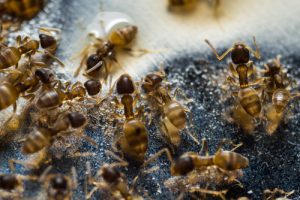Tiny Pharaoh Ants Are Difficult to Control
By Chris Williams on March 30, 2012.
Q. We have these very tiny, yellowish ants in several places in our townhouse. We’ve had a pest control company spraying for them. They’ve been out here several times and they can’t seem to get rid of the ants. I’m getting tired of this. Is there anything else we can do? Should I just get another company?
A. The answer to your dilemma depends on a couple of things. First, the type of ant you’re dealing with. “Very tiny yellow ants” sounds like pharaoh ants. If you’re dealing with pharaoh ants, I can understand why your present contractor is having trouble getting rid of them. They’re very difficult to control and almost impossible to control with spraying only. In fact, spraying insecticides around pharaoh ants sometimes makes the situation worse since it fragments the ant population into new, smaller colonies occupying new locations.
 Pharaoh ants are one of our smallest ants, at only 1/16 inch long. Pharaoh ants will feed on any sweet or greasy foods and meats, and are know to regularly switch their food preferences. They forage day and night, following odor trails to and from food and water sources. Their trails are often hidden behind baseboards or cabinets, or inside wall voids. Pharaoh ants prefer to nest in warm areas near food and water, but their nests can be found anywhere – in wall voids, heating ducts, behind paneling or baseboards, behind window frames, around toilets or sinks, in potted plants, or in furniture or appliances.
Pharaoh ants are one of our smallest ants, at only 1/16 inch long. Pharaoh ants will feed on any sweet or greasy foods and meats, and are know to regularly switch their food preferences. They forage day and night, following odor trails to and from food and water sources. Their trails are often hidden behind baseboards or cabinets, or inside wall voids. Pharaoh ants prefer to nest in warm areas near food and water, but their nests can be found anywhere – in wall voids, heating ducts, behind paneling or baseboards, behind window frames, around toilets or sinks, in potted plants, or in furniture or appliances.
The main thing that makes pharaoh ant control so difficult is that there is not just one colony or nest; there are almost always several colonies. Almost any kind of disturbance initiates movement of the colony or formation of new, breakaway colonies, called satellite colonies. One or more queen ants and a group of worker ants will leave the colony and move to a new location. This is how pharaoh ants earned their nickname, “tramp ants.”
Your current ant control is not working because insecticide sprays or dusts are repellent to pharaoh ants, usually causing colonies to relocate or split into smaller colonies. Also, sprays kill only those ants that are foraging and come in contact with the insecticide. In pharaoh ant colonies, only about 10% of the ants forage at any one time. Baits, however, are seen as food and are carried back to the colony where they can kill other ants in the colony. For this reason, baits act rather slowly because if the ants are killed too quickly they will not have enough time to carry the toxin back to the colony and to recruit other ants to feed on the bait. An ant baiting program will kill the ants but requires patience.
If the ants are indeed pharaoh ants and your pest control company is not willing to use ant baits, then yes, I would say you should shop for another pest control company. Give us a try. Our trained technicians will do a thorough ant inspection to locate the ants’ feeding sites and ant trails. Our ant baiting program is effective and is guaranteed to get rid of your pharaoh ants without the problems of insecticide sprays.